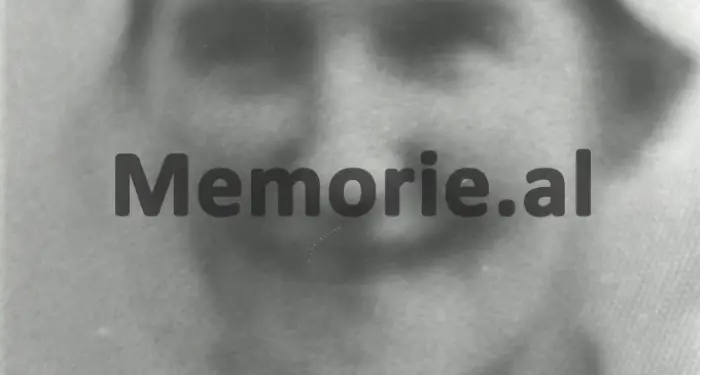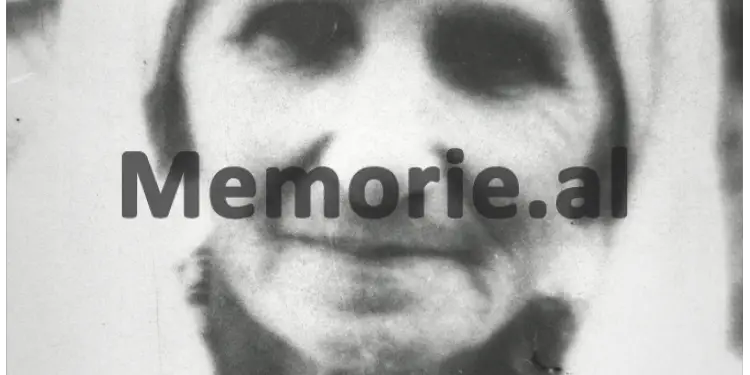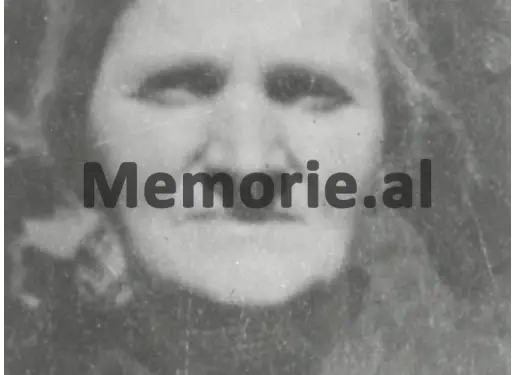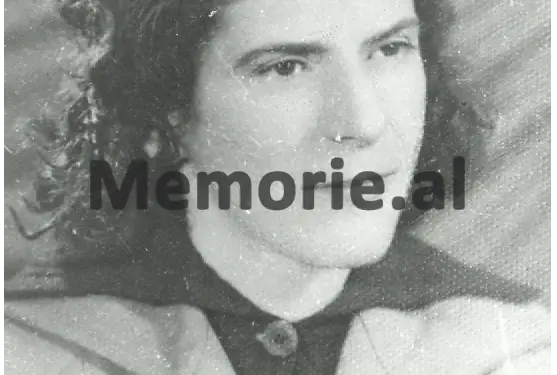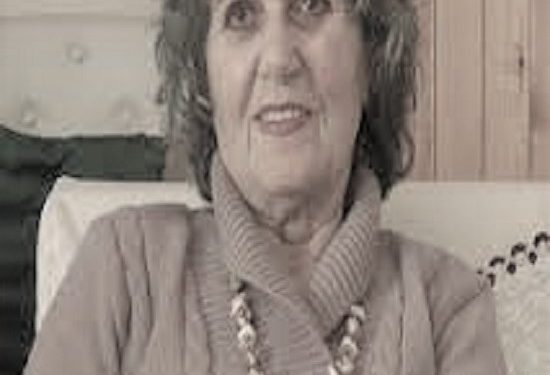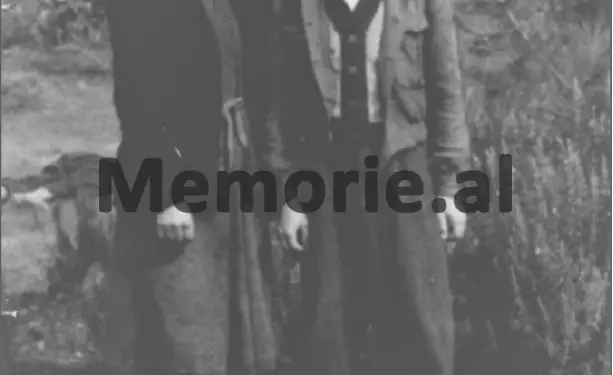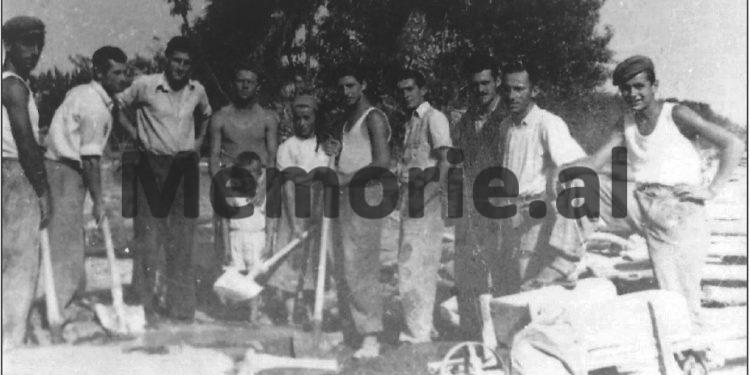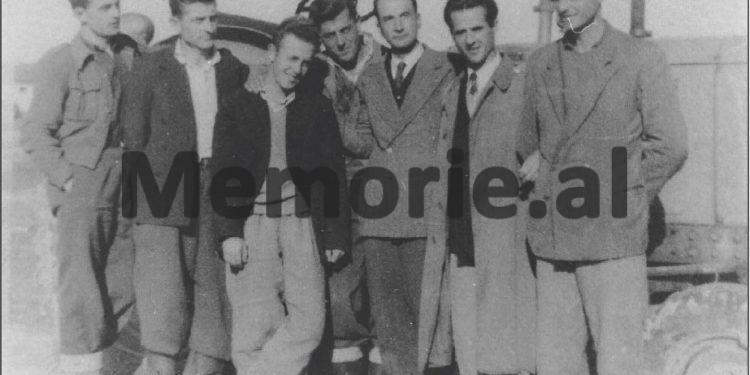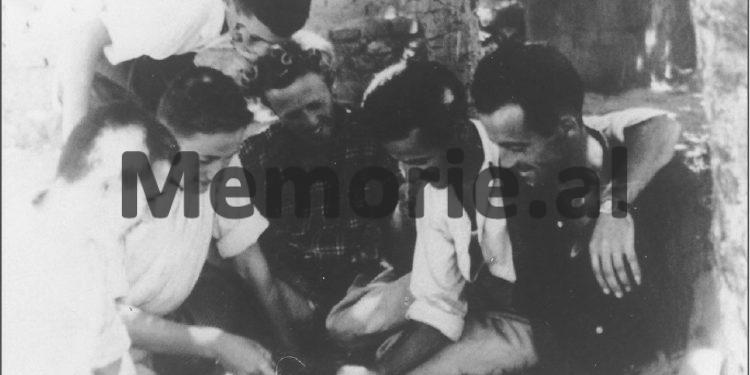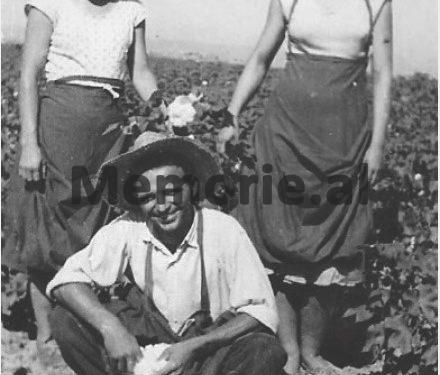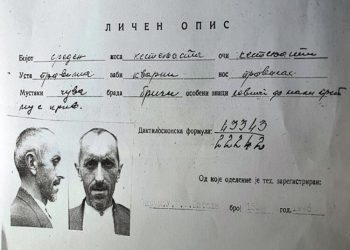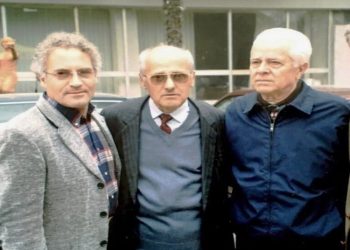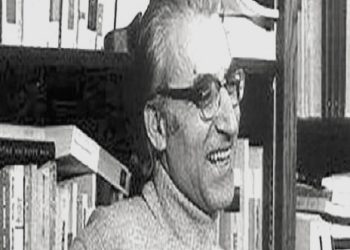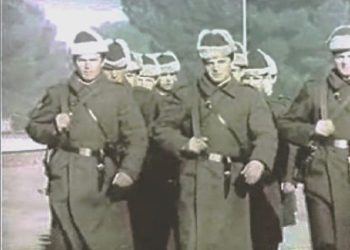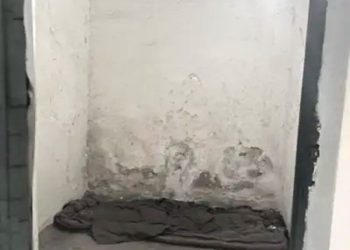Fatbardha Mulleti (Saraçi)
The third part
Memorie.al publishes some parts from the book ‘Calvary of women in communist prisons’, by Fatbardha Mulleti Saraçi, (granddaughter of the famous former mayor of Tirana, Qazim Mulleti), whose family from 1944 until in 1991, he was persecuted by the communist regime of Enver Hoxha, where Fatbardha’s father, Haki Mulleti, a former senior state administration official since the 1920s, was imprisoned and interned by his family, until died in the hospital of Tirana, poisoned by the State Security. In her book ‘The Calvary of Women in Communist Prisons’, which is the fruit of several years of work, the author has masterfully described the unknown stories of some of the Albanian women and girls who suffered in prisons and internments in the dictatorial regime of Enver Hoxha, started by her mother, Pertefe Mulleti, and in turn: Marie Deda, Hajrie Kazazi, Kushe Seknej, Mrike Pali, Zyliha Rusi, Roza Jakova, Fatime Dilaveri, Hatixhe Pipa, Marije Gjoka, Angjelina Topalli, Hatixhe Kopliku, Nafije Kop Bushati, Budije Bushati, Adile Kazazi, Antonela Dostanishta, Nafije Stërmasi, Luçije Saraçi, Adile Meta, Qeuthere Meta, Feride Damnori, Vitore Ashta, Fetije Vuçiterni, Zehnije Gjylbegu, Xhyhere Kazazi, Luçije Malaj, Leadije Kazazi, Sadije Kazazi Hava Repishti, Luçije Kurti, Rukije Bushati, Shaqe Logoreci, Qamile Myftija, Marie Ndokëllia, Rozë Çefa, Çile Staku, Shaqe Marku, Lajde Arapi, Lutfije Barbullushi, Syme Muka, Zenepe Kraja, Fahrije Kazazi, Naxhije Plari, , Lizë Vukeli, Bade Kjaraj, Hava Baçi, Xhehadire Boriçi, Vitore Kalaj, Katerina Benusi, Sofije Baja, Lenë Pjetri, Dava Markagjoni, Mrika Markagjoni, Marta Gjonmarkaj, Bardha Gjon Markagjoni, Kristina Gjomarkaj, Çelestina Pervizarki, Kune Miraka, Sultana Dine, Vera Dine, Agime Dine, Hamide Çela, Vera Dine, Kadrije Cami, Sanije Sulaj, Meliha Sulaj, Vashe Kola, Prena Llesh Gjeçi, Gjystina Seku, Ilda Melgusha, Agime Pipa (Aranitasi), Terezina Pali, Liza Pali, Adile Boletini, Nasibe Kazazi, Ana Daja, Dila Zef Ndoja, Zyraka Mano, Shanisha Dosti, Zojë Gjeloshi, Drane Stakja, Elena Luli, Sabiha Kasimati, Marije Deda, Marije Shllaku, Biçe Pistulli, Sadije Kazazi, Gjyzepina Çoba, Marta Doda , Frida Satedini, Vitore Kuka, Gjela Llesh Biba, Bardha Cub Marku, Liza Llesh Mali, Bardha Mark Bushkola, Marije Tuci, Olimbi Baruti, Angje Kovaçi, Bedrije Ashikja, Musine Kokalari, Motër Gjeorgjina, Liljana Radovani, Laura Keqi, M Mrike Zadeja, Angjelina Shantoja, Naime Koçi, Sheriar Sefa, Vitore Shllaku, Liza Gjon Voci, Nina Shiroka, Laje Mehmeti (RRema), Feride Beshiri (Quku), Hasije Ulqinaku (Quku), Sofije Kali, Çile Gjush Larja, Nurfezo Koprencka, Sanije Gjylbegu, Emilja Shest Bregu, Vida Radovani, Nedrete Pipa, Motrat e Osman Kazazi, Safete Jusif Sokoli, Çiljeta Simoni, Lutfije Buashati, Sadije Bushati, Olga Schëeizer Libohova, Evelina e Ndoc Naraçi, Geraldina Apony-Zogu, Hilda Zyma. Marie Rafael, Zade Muka, Rukije Bushati, Hajrie Vrioni, Emine Gjyrezi, Xhemile Beqir Komi, Hedije Dume Repishti, Syme Muka, Fetije Vuçiterni, Sebije Puka, Marjeta Serreqi, Dhurata Sokoli, Klara Miraka (Merlika), Asi , Liri Cenaj, Rudina Dema, Adelajde Miraka, Drane Jakja, Syriha Hasi, Aishe Gogaj, Luçija Kaçaj, Gjyljana Malaj (Pervizi), Nadide Kasaruho, Nadire Kërçiku (Peshkëpia), Shpresa Ballolli (Merdani), Makbule Frashëri, Misly Çrash Dervishi (Leka), Natali Arkandi Rozengolc (Pengili), Vigelmina Vitalij Kovaleshko (Veshi), Rukije Rama, Tefta Tasi, Liri Lubonja, Kozara Kati, Shpresa Ngjela, Vera Bekteshi, etc.
Continued from the previous issue
Rozë Jakova
(1895 – 1981)
When she got married, the most precious thing in her dowry was a national flag, which she had just embroidered. A beautiful memory for him was also the presence, as wedding godfathers, of well-known patriots: Hil Mosi and Kel Marubi. In her memory, it would not be long before other events were fixed, such as the popular armed resistance against the Serbo-Montenegrins in 1912 – ‘13 and 1920, in which her husband, Kola, also participated. With this patriotic spirit she raised her sons.
His son, Ndoci, joined his comrades, already in the anti-fascist resistance. Led by the red and black flag he held in his hand, on November 28, 1941, the people of Shkodra demonstrated in the city streets. Mother Roza, was proud of this act of bravery of her son and was not afraid when he was arrested, because he was placed in the path he had chosen: important exponent of the ‘National Front’ and opponent to death of communism, which had begun spread to Albania. The latter had not forgotten his activity and, when he came to power, they wanted to arrest him. In these circumstances he went up the mountain. She was called ‘Nana Shqipni’, who, according to Dom Ndre Zadeja, was a mother above a mother. Mother Roza, who had just turned 50, with the courage and determination that characterized her, gave her the message: “War does not want choirs”. It was the last piece of advice for him, because they would never meet again.
The other boys, Deda and Cesku, were put in prison, while him and his other son, Prenka, were interned. A year later the news came to him, that he was not the trough, but, as the men had fallen into clashes with the communists.
– Where is your gold? – They threatened him.
“Yes, I have,” she replied.
– Tell us, then, where? – Them again.
“I have three sons,” she replied calmly. – They’s gold. You took the fourth from me.
The day held itself, it was not given. And the boys marveled at the courage he had. Then came the night, and it was for her pain. One day he went to visit a friend, whose son had died in a car accident, and in conversation, he started crying. “You,” Nana Roza encouraged him, “at least know where your son is buried.” What about me? ” and instinctively turned his head from Mount Cukal, where his son’s bones lay. Even in moments of joy, he kept serious. “It seems to me like Ndoci,” she said, “puts his hand here on my neck and says, ‘Mother, do not forget me.’ Nana did not forget, no! The friends of the idea did not forget him; the whole of Shkodra remembered him. This was the greatest consolation for him. To his friends, who went to visit him or did he meet him on the street, it seemed to him that he had his son in front, they were lost…!
Mother Roza lived long, to see other casts. The untimely deaths of boys, Prenka and Deda, prominent artists, both, one in music and the other in the field of photography, solidified even more. Three boys, in the most beautiful time, were no longer near her. Every day that went by, he felt their absence. Every day and more, until he died, you took with you the honors of a city.
Fatime Dilaveri
(1919 – 1990)
This woman had everything: even the good name of the family that flowed (Rroji), as well as that of her husband (Dilaver). Also good economic situation. He lacked only health. The end of the War would come and she would feel other absences..! The dictatorship began to destroy the Rroji family. The more savage she was, the worse Fatima became. Economic problems also emerge. Within a short time, her brothers are imprisoned: Vishoja and Qazimi (the latter is shot). The other brother, Ruzhdia is hiding. All as nationalists to be tried and decided.
The open wound was very big, especially when he remembered Qazim. He had to take care of Vishon in prison. He also had to protect Ruzhdina, but the house is surrounded. Turbulent time, icy century..! The tortures begin. They are worn on her body, even though she was pregnant. They also torture their two little granddaughters. Ruzhdi, if he cannot bear it, surrenders, even though he knows what awaits him. He is initially sentenced to death, and then his sentence is reduced to 25 years. For the sister, the night became day because the brother would be alive, though 25 years in prison.
The bars of the prisons, from time to time, saw her too: so bent over, with bags full of food, that it was supposed to be her children’s lunch or dinner. How long are these 25 years? How troublesome! 25 years in a row towards the prison streets, later two hands touching, two faces meeting, a sister and a brother wanting to be together always. The granddaughter would write later: “She survived, she survived for me, her granddaughter; and the waves of her feelings collided with me and I live with the water of her sorrows. ” Despite his poor health, he is forced to work in the Brick Factory, in the collection of Sage, in the processing of slag. Even in Vaun e Dejës. The husband also works in the garden, to get the vegetables (how to buy them?), While he sells his blood (how to replace it?) In addition to misery…
With the shooting of Qazim, the eyes of my forehead escaped, with the punishment of Ruzhdia, my arms were cut off, with the sufferings of Visho, I was cut off like a withered flower “, – were words that he often repeated. He never lost faith in himself and in the people around him. She continued to walk like this in the difficult paths of life, guarding her warm heart from the freezing world, which was delayed from melting. He loved life. She struggled to be different for her children, but her heart was so weak that she could not bear the joy. She rested that day, that the second daughter turned 36…!
Hatixhe Pipa
(1895-1983)
When the communist regime came to power, the family of lawyer Mustafa Pipë was in Tirana. The first son of the lawyer, also with this profession, Myzaferi continued to work in Shkodra, inheriting his father’s law office. Very soon, as soon as the persecution started, one of the first families to be expelled from Tirana was the Pipa family. She settled in Durrës, to be close to the prison of that city, where the other son, Professor Arshiu, was buried.
Meanwhile in Shkodra, after the Postriba Movement, the investigator Myzaferi was arrested and died. The family wears black. A death with a lost grave. Two years later, the daughter of the house, Bedi, who was ill with tuberculosis, dies. After a while, the honorable old man, Mustafai. The clothes of mourning as if they will not be stripped in this family …!
Who was left? Only Mother Khadija with three daughters. An old-fashioned old-fashioned mother with white hair, who spends her days sewing quilt onions. Three girls, one better than the other, destined for manual labor, enough to get bread crumbs, to feed themselves, and to help her brother in prison.
Several times they were evicted, from one neighborhood to another, into increasingly uninhabitable homes. Finally they settled in Shkodra, in the house of the first, which was falling inside, because it needed to be repaired. Mother Khadija becomes the backbone of the house. As a good hat, she warms in her gender the two young girls, Nedretin and Feimen, that Bukurusha was married, when they came from the bricks or the mat..! They are left with only high school, although they know 2-3 foreign languages, which were almost considered heresy. High school was not for them, although they had been excellent in teaching.
Mother Khadija was a compassionate mother. She lost her found son, Myzafer, lost her daughter, Bedin, a true intellectual. She also lost her husband. Later he would be left without Arshi and Feime, who would escape. The other girl’s cfiliteshin. Poverty was extreme. Her merit was that the whole family kept their heads high. Humility, filth, vices, was not known in that family, because after her husband, she was the educator herself and the example of her family. There was indeed a Mejtep, where he had learned Turkish. But he learned Albanian himself, not only to write a letter, but to read the classics of world literature.
This woman had cooked her conscience with sound Albanian morals. She was also a religious believer and followed the norms of the religion, with the utmost fidelity. Proud of nature, she was also fragile in spirit and always righteous, as true Albanianism and religion teach. Although poor, she found opportunities to help the poor. He was born in Shkodra and died in exile. She was buried in the village where her daughter, Nedreti, was interned, with her family. He was buried and loaded on a village cart, put in a simple coffin, accompanied by family members and two other internees. She, who deserved a magnificent burial,. Today, her remains are buried in the Sharra cemetery in Tirana, together with the remains of the selected girl, Bedit.
Marije Gjoka
(1924 – 2010)
A creepy popular expression says: “Do not, O Lord, how long the slave endures”, that man, as it is known, carries a lot…! And if he seeks a concretization of this expression, nowhere can he find it more than in a very noble and very miserable woman, called Marije Gjoka (Mazrreku). The sorrows in her heart came to an end, as the avalanche of snow gathers.
It was a working family, poor like many families in our desert Albania…! Their father died early, if their mother raised them, as it is said: “with the nails of the doors” … There were six children. One sister got married, while the other was adopted by a couple. Of the brothers, one became a priest, the other, Rroku, a carpenter. Dom Nikolli was considered the head of the family. It was “Nikë Barcolla” (literary pseudonym) who would make that famous controversy with Father Fulvio Cordinjano, who, although he had worked so hard for Albanian culture, in an article had expressed himself very badly for Albanians. After a while, Dom Nikolli was transferred from Tirana (where he served as a parish priest) to Kryezi in Puka. Rroku and his sister, Marija, went with him. They left for that remote village on a winter day, with rain…! And this is where the tragedy started…! Imagine a citizen of Shkodra, in a deep mountainous area, without light and water, in the middle of high mountains, in a poor village of Puka, just as Migjeni described. And it was 1944, the year that, even in those distant mountains, the smoke of dictatorship had begun to be heard. The news, especially to Catholic clergy, was grim. The first cleric to be shot was Dom Ndre Zadeja. Others will come after him…! Dom Nikolla knew this well, so his face darkened. “But in the hand of God,” said the poor mother and sister in a low voice. The insidious beasts wanted to start the martyrdom of this family not from the priest, but from his brother, Rroku. For this we had to find a cause, even if we created them..! And while Rroku, on the orders of Dom Nikoll, was going to repair some doors and windows of the church of Fleti, on the way he came across Security people, who were walking with a person sentenced to death, who had to show them the places where they were Hid the fugitive. And the accusation was made: Rrok Mazrreku, he wanted to meet with those of the mountain…! He was immediately arrested. After a few days, they also took Dom Nikolli. The two brothers never saw each other again. Mary and her mother were left alone as if stunned. After five years, Rroku was released from prison and came to live with his family in the village. He started working as a sawmill. But one day an old shack caught fire. Rroku, along with three workers, ran to turn it off. But they did not succeed. And so it took…! He was also arrested as a “saboteur”! Days of torture and horror began again. After a while the hour of death came. It was December 25, Carnival Day. They brought the black one. Duarlidhun. They placed it next to a pile of planks. It was pretty boy, 28 years old, at the most beautiful time. “What did they tell me?” The executioner asked. And he replied: “Long lives Albania, with true freedom!” I wanted to add something, but they did not leave it, because the battery crisis. The villagers dispersed in horror. The black mother shot at the spring of your village to fill it with water. I was shaking when I heard the rifles…! A villager, tue turned, saw him. He took off his hat, and in a trembling voice said to him, “You are healthy, the priest’s mother, because the boy was shot.” Maria says: “We were both left as birds to be forgotten.” Nana, since that day, you do not make light. Dr. Karagjozi said: “His heart has come out of the mud.” Here Mary was left alone. He was 18 years old. Now began a new path: that of prisons and internment camps. In the snow and in the rain … and this not a little, but for 37 years.
So many years of hardship would make every Mandela blush: sometimes you took care of your brother and later, even of the man, who also tried prison, because he was married to a “touch”. So, after the death of his mother, do not tolerate loneliness, he married Bibë Gjoka, a local from the village. Wise man, but very poor. They once left Puka and came to Shkodra.
They built a new nursery. God filled their hearths with sons and daughters. They had 6 children. Mother Mary was revived (though the road to prison was almost never cleared). But he was not told to enjoy. The path of torment had not even gone halfway…! It was July, when the bad news came. The boy was a soldier. The mandate was brought to him by his two friends, with tears in their eyes…! Andri, the lollipop of the heart, was drowned in Dri, for the carelessness of a superior. And he was 20 years old. Mother Mary ran like crazy along the river. Drini had taken his drowned body and had placed it somewhere far away. “After five days, the rot turned black, / the black mother was brought home.” And he buried him, behold, with his own hands. Now, almost every day, another path has begun: that of the cemetery. The slab of the tomb is still clean today, like a mirror, why:
And so almost ten years passed. It was thought that her suffering was over, but no … there was still. Worse than it’s worth it. The other boy, married with two children, became seriously ill, with the disease of…! What they did not do for his healing. He was also sent abroad to Rome. Black mothers everywhere with him, until he died in their hands there and abroad…!
This concludes the story of Mother Mary. Now she lives in vain, like a shadow. Nothing warms me anymore. l seems to have lived two centuries in a long and frightening dream. Two things keep her alive: grandchildren, who gather like birds around their grandmother, and the flowers she occasionally sends to church. She prays and prays..! As before God. She prays that there will be no more mourning in her house. She prays to God both for those who loved her so much and for those who brought her so much suffering in life (and she knows them by name). But, she forgives, why is mother’s heart. And the mother’s heart is always a sea of hope, faith and mercy./Memorie.al
The next issue follows




